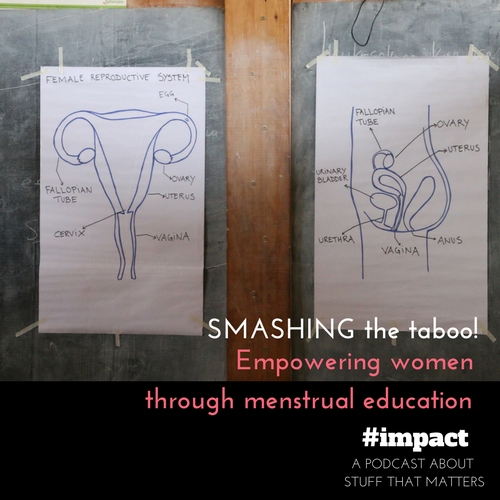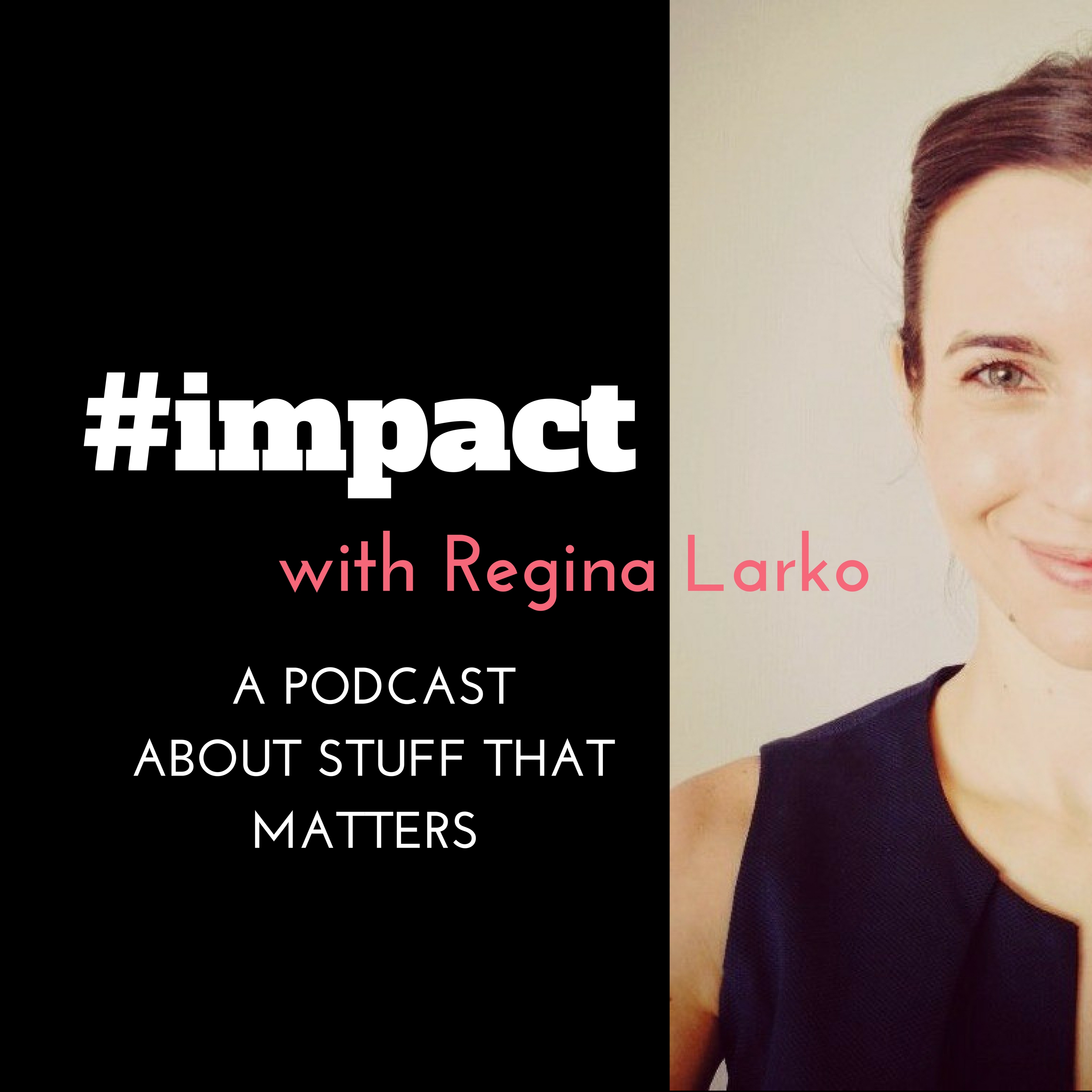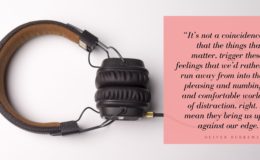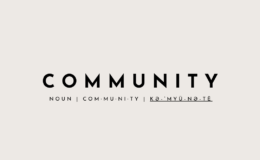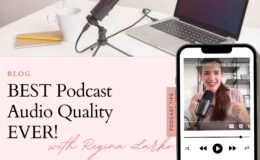We sat down with Zoe Chan, Founder Happeriod, HK’s one-stop platform for all things menstruation and Julie Kjaer, CEO and CO-Founder of Ruby Cup, a social business whose goal is for every woman to have a healthy period, regardless of her background.
Zoe got to know the Ruby Cup brand through a friend whilst she was travelling in Germany. Very soon, she got in touch with Julie and they quickly realised that they had common ground in empowering women. Today, Zoe resells Ruby Cup through Happeriod and is pioneering Ruby Cups’s Buy One Give One Programme in Asia. We can’t agree more with them, it’s time to smash the taboo and start talking openly about menstruation and our bodies. Not only with women – this conversation has to include men as well. Find out why in this interview.
If you ever published an autobiography, what would be its tagline?
Zoe: “Know Yourself and Own Your Choices”. Earlier in my life, I really had trouble finding out what kind of job I liked and would be happy doing. Eventually, I realised that life is all about finding yourself and knowing more about your own personality. For me, life is about breaking stereotypes that hold back women and not necessarily going with something mainstream. I was searching for the way that was right for me and became much happier when I found it. If life was smooth and none of your choices resulted in failure, there would be no challenge.
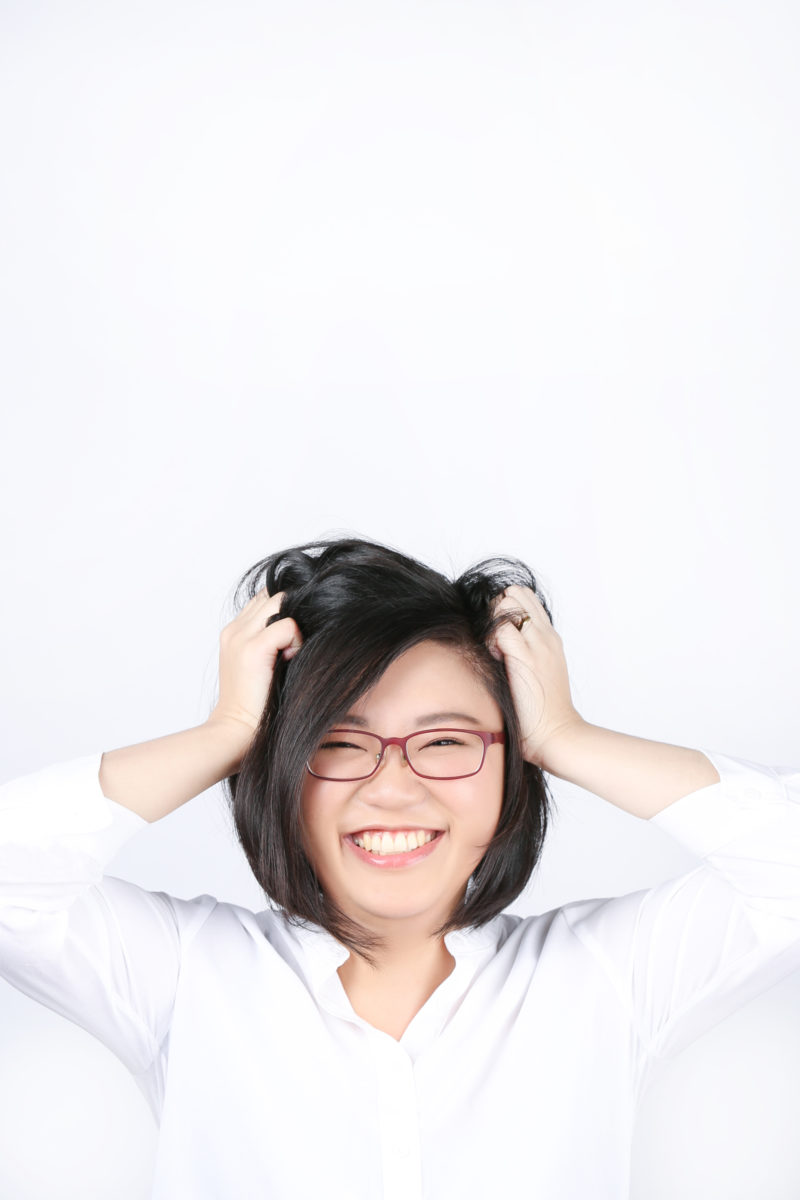
Zoe Chan, Founder Happeriod, HK’s one-stop platform for all things menstruation. In addition to selling menstrual products, Zoe provides education about menstruation and body autonomy, which helps women to know themselves and make their own choices.
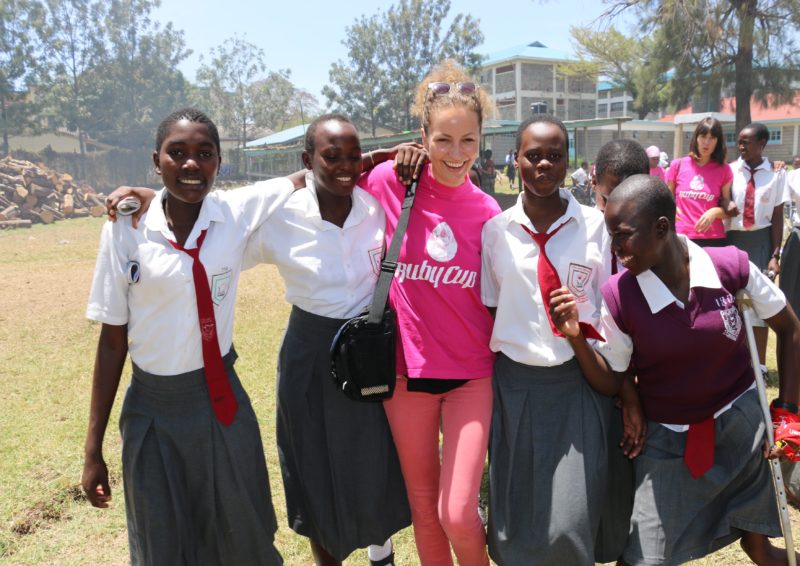
Julie Kjaer – The CEO and CO-Founder of Ruby Cup, a social business whose goal is for every woman to have a healthy period, regardless of her background. Ruby Cup has a “Buy One Give One” donation programme, where for every menstrual cup purchased, Ruby Cup donates one to a person in need.
Julie: “Learning comes through Action”. Taking action is really important as through taking action, we get to know ourselves. Failure will shape the journey. However, taking chances and failure is good. If you don’t fail, you won’t get anywhere.
You are based in Hong Kong (Happeriod) and Barcelona (Ruby Cup) – What do you love about the social impact community there?
Julie: I guess Ruby Cup’s experience is not really typical as our travel means we are global citizens. We started in Kenya and have been in Barcelona for the last 3 years. Kenya was the most important place when Ruby Cup was born. It was an open land of opportunity where so many markets were unexplored. Kenya is teeming with young people that want to create market-based solutions to make a better life. It’s really tech-based and Nairobi is the Silicon Valley of Africa. For instance, there are apps for farming and weather forecasts, so being in that kind of open environment is very inspiring.
Zoe: In Hong Kong, I worked in the social sector, in an NGO before. We talked about our services and helped our clients to have a better life. However, the work was very tiring and was really hard to connect with the general public. I guess also for my work, in the general context of Hong Kong we don’t receive any gender education or much sex education. Therefore we haven’t really talked about or gotten to know our bodies clearly. So, I think because of the topics I address, my experience of the social impact sector is a bit different to most other social enterprises in HK. Because even within this sector, some people are really conservative and refuse to talk about sex or their periods.
Tell us your vision for Ruby Cup and Happeriod and why you started the platform?
Zoe: My long-term vision is for gender equality. This begins with women making their own choices. Right now, many supermarkets in HK, don’t even stock tampons. So I started the platform to introduce different menstrual products to the HK market so that people know they have a choice.
Julie: My vision for the business is that menstrual cups become part of the mainstream. I started Ruby Cup so that we could impact more people. I hope that over the next few years we will sell more and donate more cups to women in need through our Buy One Give One Programme. I also hope that we continue to strengthen our partnerships for “Give One” part of the programme in Hong Kong, Nepal and Africa.
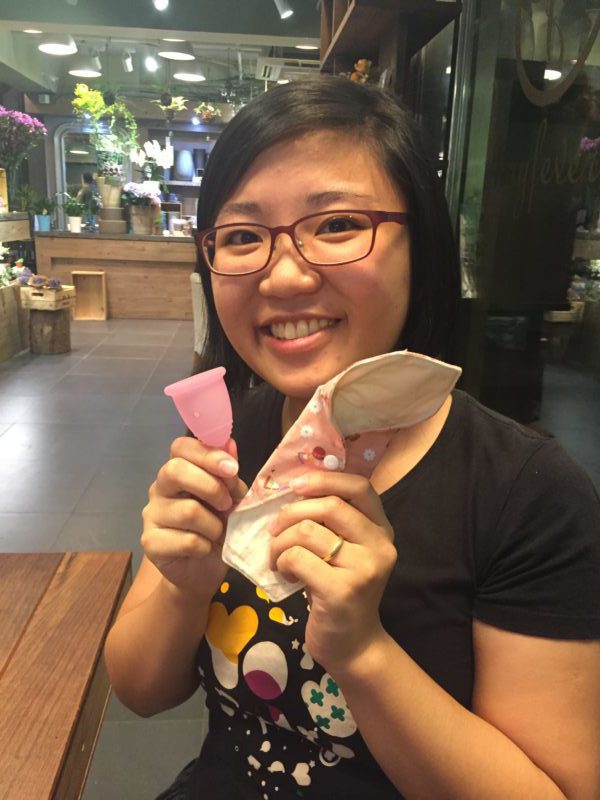
Zoe encourages everyone: Own your choices!
Was there a certain moment you decided that you wanted to build something from scratch?
Julie: So Ruby Cup’s co-founder was using a menstrual cup and she introduced it to me. At the time, there were lots of people around me trying to get donations of mainstream disposable menstrual products, like tampons and pads for refugees. I thought, “Why not menstrual cups? They last longer”. So, even though the cup was just an idea, we applied for our first funding grant. Then we went to a developing country to try it out and I was there for 3 years. As you can tell, I always think it’s a good thing to always say yes and never say no.
Zoe: I was first inspired by a group buying experience with other feminists and activists. 12-14 women bought some menstrual cups online. That month we kept sharing our experiences with each other on Facebook and on social media. It was so amazing to find that by using this product, you are suddenly so much more aware of your body. This experience led to more group buying with friends. Happeriod was started because many women in HK were looking for menstrual cups but didn’t know where to go to buy them.
Who inspires you personally?
Julie: Actually it’s really hard to mention a single person. The people I am inspired by most by are the local girls and women, we hire to give workshops in Kenya. They really have some challenges in life, but it’s so inspiring to see how they keep the fight going to improve the lives of other women.
Zoe: I have been quite lucky to have a lot of professors who are looking out for me. It’s not a popular choice to quit the NGO sector to start a business, because there is a perception among some people that business is evil. So I have a network of professors and also some activists who want to support me, and they inspire me to keep going.
Do you measure your impact?
Julie: In the Ruby Cup “Give One Programme” the most important indicator we measure is the adoption rate of the cups i.e. after receiving the cup, is it still being used over time. This is important, otherwise, the cup and the initial education to help impoverished women is wasted.
So we know from measuring the adoption rate that we need to have good follow up. For example, if we give out cups with no follow up the adoption rate is 30% vs 80% if we do hands-on follow up.
We also measure how students who receive our cups perform in class because girls often miss school if they have no access to menstrual products when they have their periods. So we keep track of their grades and enrollment data.
Zoe: For us, we collate customer feedback about using menstrual cups. In HK menstruation is a relatively new topic for women to talk about openly. Women who buy menstrual cups from us have often done their research and found some educational resources on our site, which helped them overcome some mental obstacles to take charge of their own choices. Feedback from our customers rose from 100 pieces per year when we first started to more than 1000 pieces per year now.
What do you wish you had known before starting out?
Zoe: You need to be focused on what you believe in. Because menstruation is kind of difficult to talk about in HK, in the beginning, I modified the message depending on what people thought the public was able to hear. However, it was not me and what I stood for. Now, I am focused on my own values and my message resonates much more. So, my advice is: don’t be swayed, stick to what you believe and what you want to say.
Julie: Failures shape where you are right now, so don’t hold any regrets if you fail. Similar to Zoe, stick to your guns and don’t try to please too many people. You will be pulled in so many different directions so it’s important to say “No” and stick to what you believe.
What’s the craziest thing you have done to market your organisation?
Zoe: Crowdfunding! It seems that the mainstream in HK thinks that social enterprises are about hiring people with disabilities. They don’t think social enterprise is about solving a specific social problem through a specific business model. There actually seems to be a psychological barrier where people think that doing good cannot involve earning money. So in HK, activists might think “profit is evil” and business people will think “how will a social enterprise make money?”
So the main aim of Crowdfunding Campaign is to raise money to print our educational toolkit on menstruation, and this will empower future generations of women in HK. We want to raise enough to distribute these booklets to all of HK’s secondary schools, universities as well as non-profits in HK, that work with marginalised women.
However, the other aim of campaign is raise awareness about Happeriod, about menstruation itself and to bring Happeriod’s educational message to the general public.
Julie: We did some grassroots level marketing, where I would always keep a cup in my bag and I would buy shots for people to drink from the cup. This would start the conversation around menstruation.
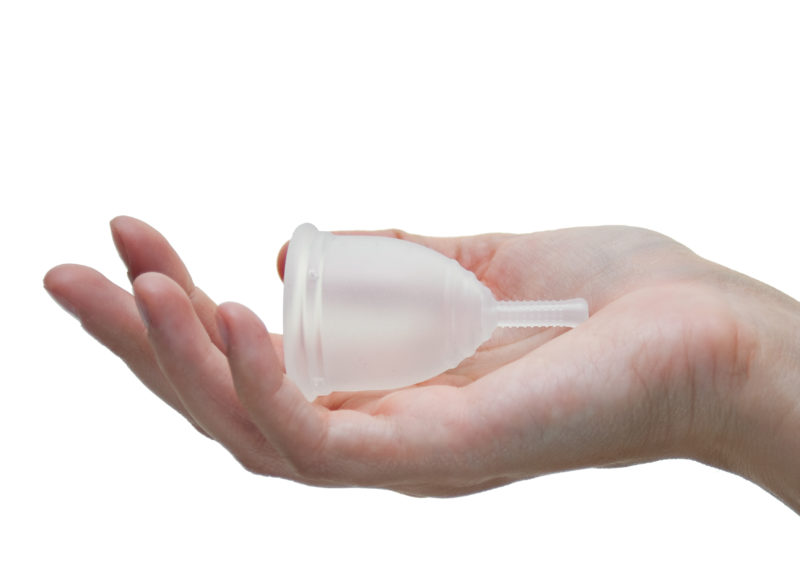
Want a shot? Julie got creative when marketing her Ruby Cup by offering shots to people from the cup.
What gives you the worst sleepless nights right now?
Zoe: Actually, what keeps me up is how to best communicate with the general public in HK. Because of the taboos on menstruation, we get very limited information in school. So some women literally don’t know anything about their body parts or the terminology for them. They also don’t know how to choose the right size and shape of a menstrual cup for them from among so many brands. And as women have real difficulty speaking about menstruation, it sometimes backfires if you write a long passage with a lot of detail about menstruation and how to choose a menstrual cup.
So I am always thinking about how to effectively communicate to help women to get to know more about themselves and make their own choices about their periods.
Julie: What keeps me up at night is the general growth of the business and how we can get menstrual cups to go mainstream. I feel very lucky to be part of making something that adds something positive to so many people’s lives.
I also really think a lot of boys. Namely, in a lot of societies, boys have a lot of questions and almost no education about women. I wonder how to start the conversation about menstruation with them.
What was the most memorable moment for you working on RC/HP so far?
Julie: In Kenya, I was visiting one of our partner schools, that educates disabled children. A girl from one class had written a poem about Ruby Cup and her classmate read it out for her. It was about how Ruby Cup came to their school and gave them smiles.
Zoe: A 12-year-old HK girl reached out to me on Instagram. She hadn’t had her period yet but wanted to order cloth pads. I asked her why she chose cloth pads. She replied that menstruation is normal, she already washes her underwear and she doesn’t want to produce waste. This sparked my interest in doing school programmes because it’s possible to break HK taboo around menstruation for the next generation by supporting young people to feel periods are nothing negative and they can choose the right option for themselves. Although, once they learn about alternatives, I am not sure how many girls will make the choice to use plastic pads.
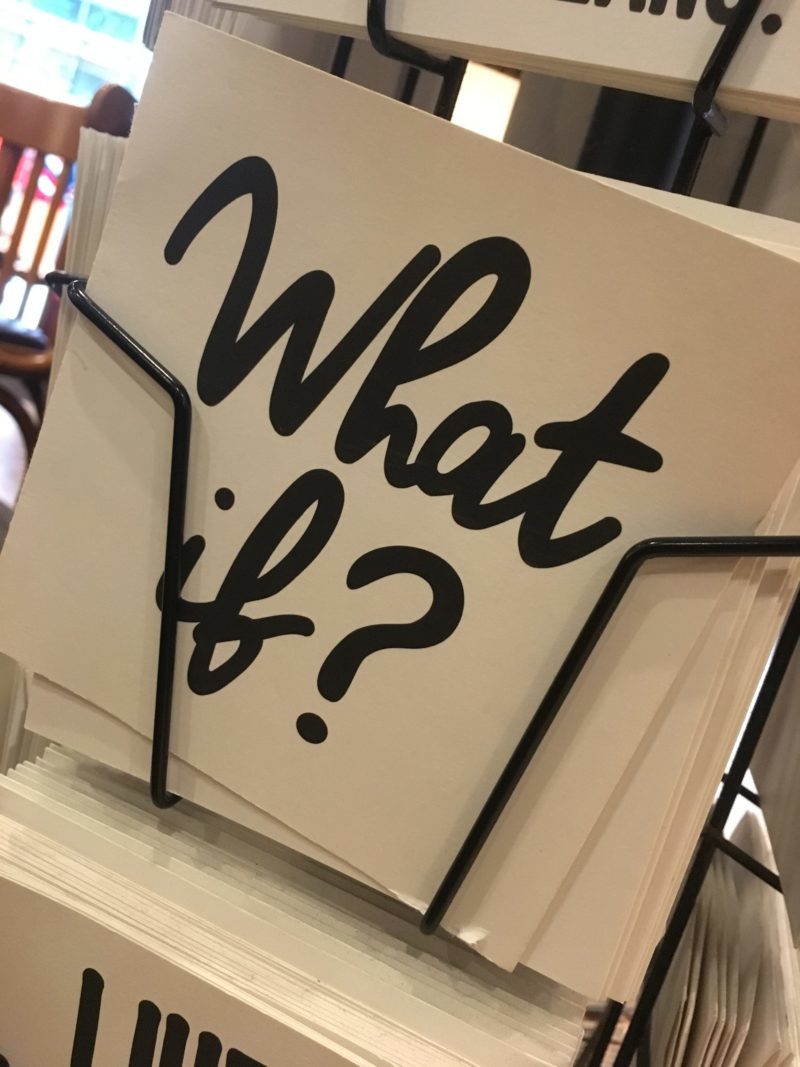
What if there would be a more open conversation on all things Menstruation? Zoe and Julie believe that it is possible and the impact would be massive!
What can people do now to make the world a better place?
Julie: There are 2 things people can do. Firstly, talk about periods and gender equality, to anyone and especially boys and men. If there is no dialogue surrounding any topic, myths and false information will spring up in place of discussion.
Zoe: Talk about any topic and be willing to listen. If you have an opinion, once you have listened to another opinion that is different to your own, you will know will know what the conversation is about.
Where can we follow you?
Zoe: https://happeriod.com/ or https://www.facebook.com/happeriod/
Julie:www.rubycup.com/ or www.facebook.com/RubyCup/
Tell us a little about the crowdfunding campaign/why are you doing this and how can it impact the community here and how people can get involved?
We are funding a book about menstruation so that teachers can have some assistance talking about periods with students. Sex education is pretty basic in Hong Kong. There is not much mention of menstruation, schools don’t have the resources to talk more about it and the topic is pretty taboo in society generally. We want to fill in the gaps and make it easier for educators to empower the next generation of HK women, with knowledge about their bodies. We want to smash the taboo and reduce the shame and stigma of menstruation for girls and boys and in the future.
This is a really important campaign because almost everyone is touched by menstruation. We all started within our mothers bodies and 50% of the people we either work with or interact with will have menstruated at some time in their lives. It’s time to break the taboo. There are a few days left to go and we are HKD12,000 of reaching our ultimate goal of releasing our book to all secondary schools, universities and non-profits in Hong Kong.
